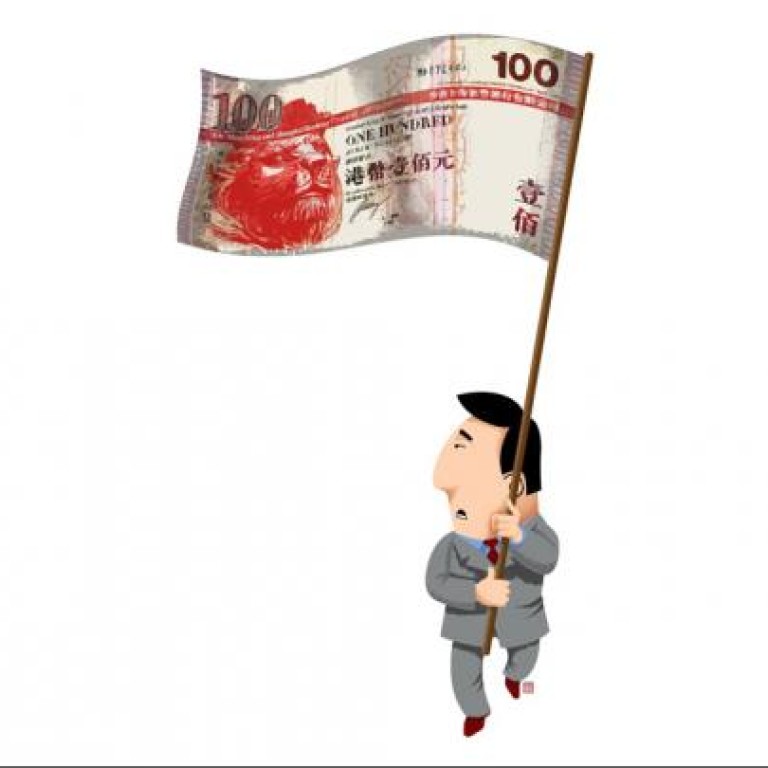
The price of freedom
How many days do you have to work to cover the basics of life? As Hongkongers keep putting in the hours, we break down the numbers
Does it ever feel like all your money disappears on bills? That you are not really working for yourself at all, but rather for your landlord, a host of utility companies and the local food store?
You might be intrigued to know how many days of the year you spend covering basic bills.
For this breakdown, we looked at a Census and Statistics Department household expenditure survey done in 2009-10. Citi, a consumer bank, helped interpret the data.
Unsurprisingly, the single biggest monthly outgoing the typical family in Hong Kong faces is rent. The survey shows that housing costs account for 40 per cent of total outgoings for people living on Hong Kong Island.
Across Hong Kong, rent or mortgage payments make up an average of one-third of the typical family's monthly outgoings, according to the survey.
Priscilla Ng, country marketing director of Citi Hong Kong, estimates that a typical family would have to work 15 days to earn enough to cover their housing costs each month. This assumes a three-person family with two earners on average pay.
Hartmut Issel, a head of research at UBS Wealth Management, is not surprised that housing accounts for such a high proportion of the family budget.
A UBS report published in 2012 that compares purchasing power among consumers in 72 cities finds that Hong Kong has the world's most expensive rent.
The report is aimed at expats. It finds that a furnished four-room flat in Hong Kong built for tenants in a "mid-level management" role costs US$14,490 per month - higher than Manhattan.
"Hong Kong is in a special situation. It is a booming financial centre with very limited space. Many of the other financial centres have suburbs and that can bring down the rent," Issel says.
Hong Kong is in a special situation. It is a booming financial centre with very limited space. Many of the other financial centres have suburbs and that can bring down the rent
Bear in mind that Hong Kong is a city of wide-ranging income and expenses disparities.
Rents vary widely depending on location, of course, and whether a person has access to public housing, for which the average rent is just HK$1,540, according to Housing Authority figures.
There are extremes at both ends of the spectrum, from South Side luxury flats to cage dwellings. But even rent paid by "typical" Hongkongers was the eighth highest out of the cities in the UBS study, at about HK$14,000 per month.
The affordability of such rent depends, of course, on families' incomes, which vary widely in Hong Kong. Those on big salaries will surely find their way into a properties expensive enough to bite into their income. Those on lower incomes depend on public housing or may even live in caged or partitioned housing, or something similar.
Professor Denis Wang Yu-long, director of global business studies at the Chinese University of Hong Kong Business School, says Hongkongers' desire to own property as an investment drives up flat prices.
"People deliberately buy expensive property in a good location, with the expectation of capital gains. This mindset means Hong Kong housing costs cannot be compared with the housing costs in other countries," he says.
Food is another major expense, accounting for 27 per cent of a typical family's monthly spending.
A basket of everyday food items costs 18 per cent more in Hong Kong than in New York, says UBS, and almost double what they would cost in Kuala Lumpur.
Hongkongers also spend a lot on food because they love to eat out; slightly more than one-third of the average food budget is spent on restaurants, according to government data.
Eating out is the single biggest expense for those living in public housing - more than rent, groceries or transport. Those living in public housing spend 27 per cent of their budget on eating out and just 11 per cent on housing.
Regardless of income bracket, eating is an affordable indulgence in Hong Kong.
The UBS study found that it would take a professional in Hong Kong just 10 minutes to earn enough to buy a Big Mac, compared with 16 minutes in London and Paris and 36 minutes in Bangkok.
"Hong Kong restaurants are loaded with value, and some provide very cheap food" says Wang. "If you buy the ingredients and cook [them] yourself, it will be more expensive than some of the restaurants."
So it seems that essential items are expensive in Hong Kong relative to income, but that discretionary items are cheap. And that's why so many Hongkongers own the latest smartphones and designer handbags, and why they eat out all the time - but also why, at the end of the day, come home to a shoe-box apartment. We are affluent, gadget- and fashion-rich, but starved of space.
